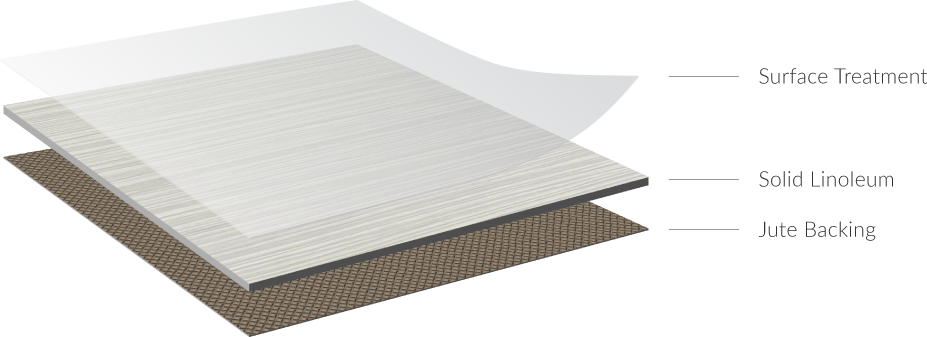Description
Invented in the 1860s – with a number of improvements since then – linoleum as a floor covering has been largely replaced with vinyl flooring which has similar properties of flexibility and durability but with greater brightness and translucency. The term “linoleum”, often used as a generic term for resilient flooring, is a very specific type of flooring. Linoleum is experiencing a revival in popularity, due to its natural ingredients and environmental properties. Linoleum is manufactured in Europe and imported into the United States.
Composition
Linoleum is made from all natural ingredients. Included in these natural ingredients are linseed oil, wood flour, limestone, cork, and tree resins. Linseed oil is derived by pressing flaxseed that is dried and ground into a powdery binder. This is combined with limestone, which is extremely abundant, pine resin, and cork and wood flours to form a doughy material to which color is added. Once pressed, it is rolled onto a jute backing and dried. Jute is spun from fibers of jute plants grown in India and Bangladesh. Available in a variety formats including:
- 12 in. x 12 in. Square
- 12 in. x 24 in. Rectangle
- 24 in. x 24 in. Square
- 6.5 ft. x 98.4 ft. Sheet
- 6.7 ft. x up to 101.4 ft. Sheet
Construction

Advantages of Linoleum
- An all-natural alternative, linoleum is very durable, withstands heavy traffic and scratches, and lasts for decades.
- Bio-based construction.
- Linoleum comes in a wide variety of colors, from quiet neutrals to vibrant hues, and the colors and patterns run all the way through.
- Choose from sheets or tiles.
- Sheet linoleum lends itself to vibrant designs through borders and insets.
- Linoleum tiles can be arranged in virtually any pattern imaginable.
- While more prevalent in commercial spaces linoleum is an attractive option for residential use as well.
- Soft in feel and warm to the touch.
- Renewable natural ingredients: linseed oil, jute, cork powders and tree resins.
- Through-pattern wear layer provides durability and a consistent long-lasting wear appearance.
- Colorfast – even as it naturally wears down over time the hue found on the surface of the floor does not fade.
- Abrasion and gouge resistant.
- Naturally insulating and light-reflective colors.
- Resistant to alcohol-based hand sanitizers.
- Biodegradable – linoleum will decompose over time without releasing harmful gasses or toxins into the air.
- Natural, antibacterial properties.
